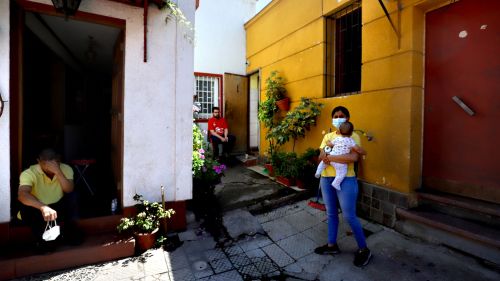Public Opinion as COVID-19 Cases Slow in Some Countries, Increase in Others

The Chicago Council’s polling team examines public opinion on COVID-19 from the United States, France, the UK, Italy, and Canada.
This week the world passed the 38.5 million case mark, with over 1 million deaths attributed to COVID-19. European nations are experiencing precipitous increases in new cases and many governments are imposing new restrictions in order to alter the trajectory of the outbreak. At the same time, countries such as Japan, South Korea, and New Zealand have had nearly no new cases over the last several weeks.
The Council survey team is providing updates every other week on public opinion around the world on the COVID-19 pandemic. This week, the Chicago Council Survey team’s update includes polling results from the United States, France, the UK, Italy, and Canada.
There will be one more COVID-19 update from the Council survey team before election day in the United States.
Key Findings
- Seven in ten Americans say President Trump did not take the risk of contracting COVID-19 seriously enough (72%), and did not take appropriate precautions when it came to his personal health (72%).
- In Fox News polling, seven in ten (70%) likely voters say that American democracy is in danger.
- When asked about closing businesses and ending activities to mitigate the coronavirus’ spread, only 14 percent of Canadians feel that the government should order a full shutdown.
- As President Emmanuel Macron imposes a 9pm curfew on several large cities in France, 76 percent of French people believe that it is necessary to accept the reduction of individual liberties because the priority is to protect themselves against the disease.
- As Labour leader Keir Starmer and Prime Minister Boris Johnson disagree over how to handle the rising rate of new COVID-19 cases, 54 percent of Britons say the UK government is not taking the right measure to address the coronavirus pandemic.
- Amid rising cases in Italy, Prime Minister Conte has imposed further restrictions while 85 percent of Italians say they are worried the virus is returning.
United States
7,954,745 cases, 216,792 deaths
Millions of Americans have contracted COVID-19 over the course of the pandemic—including President Trump. The October 2 announcement that the disease had penetrated the White House was shocking news.
Many Americans blame the President for his flouting of coronavirus precautions. ABC News/Ipsos polling conducted immediately after the news broke found seven in ten Americans (72%) thought the President did not take appropriate precautions when it came to his personal health. The same proportion (72%) said he has not taken the risk of contracting the coronavirus seriously enough.
However, the President’s diagnosis may not affect the safety measures taken by many Americans. Axios/Ipsos polling from October 1-5 found most Americans say that the news of the President’s positive COVID test would not affect whether they wear a mask or keep a distance of six feet from other people (77% each). And as has been the case for several months, the vast majority of Americans (88%) wear a mask at all times or sometimes when leaving the house.
The president’s diagnosis and subsequent hospitalization thrust his handling of the pandemic back into the spotlight. That’s not a strong point for the president: ABC News/Washington Post polling from October 6-9 finds a majority of registered voters (55%) say they trust Biden more to handle the coronavirus outbreak, compared to 38 percent for Trump.
Already, more than 13 million Americans have cast their ballots, and for many voters, the pandemic is top of mind. Fox News polling finds 44 percent of likely voters name the pandemic and the economy as their most important factors in deciding their presidential vote this year. The same poll finds seven in ten likely voters (70%) believe American democracy is in danger.
France
779,063 cases, 33,037 deaths
France’s rate of new infections has far surpassed its peak in late March and early April, and President Emmanuel Macron announced a 9pm curfew for 20 million French people just days after Prime Minister Jean Castex declared that “we are in a strong second wave.” The curfew will affect French people living in Île-de-France (Paris), Lyon, Toulouse, and several other major cities. Beyond the curfew, Castex announced additional safety protocols for restaurants, the prohibition of private gatherings, requirements for telework, and additional aid for businesses.
Amidst rising case numbers and looming restrictions, large majorities of French people continue to worry for the general state of public health in France (77%), the health of their relatives (74%), and their own health (57%) according to a September 16-21 Odoxa Survey.
However, the prospect of reduced liberties in order to halt the spread of the virus is not an issue. An October 6-7 Elabe survey found that three quarters of French people (76%) believe that it is necessary to accept the reduction of individual liberties because the priority is to protect against the disease. Moreover, two thirds (66%) agree that fighting against the COVID-19 pandemic must be the priority, even if that significantly limits social life.
Yet when it comes to issues of the economy, the French are less willing to compromise. While half say that the most important thing is to half the COVID-19 pandemic, even if it has a negative impact on the French economy or employment (50%), another half says that the most important is to restart the economy and preserve employment, even if the COVID-19 pandemic continues to progress (49%). A September 30-October 1 Odoxa poll confirms the fear of a declining economy with the finding that 81 percent of French respondents are not confident about the future of the economic situation in France: the highest level since March when the French lockdown began.
The United Kingdom
654,644 cases, 43,155 deaths
As cases in Britain reach new peaks, Labour leader Keir Starmer has called for a ‘circuit break’—a short period of time where restrictions are ramped up in order to curb the upward trajectory of the COVID-19 outbreak. But, Prime Minister Boris Johnson has instead put forth a ‘three-tier system,’ aiming to avoid the ‘misery’ of a national lockdown. The three-tiers refer to alert levels—medium, high, and very high—which entail different magnitudes of severity in regard to the restrictions applied. Much of England remains in the ‘medium’ level, but the Liverpool region is the first to enter the ‘very high’ tier and portions of the North and the Midlands face additional restrictions. An October 6-7 Redfield and Wilton survey found that a majority of Britons (54%) do not believe that the UK government is taking the proper precautions to address the coronavirus pandemic.
At the same time, Chancellor of the Exchequer Rishi Sunak has announced a scheme to pay two-thirds of the wages for Britons whose jobs have been cut due to lockdowns or other restrictions. But, a majority of Britons (72%) are either somewhat confident (50%) or not at all confident (22%) in Sunak’s ability to take the measures which best protect the economy.
Further complicating the economic issues of the United Kingdom, the spending already undertaken by the British government has risen the national debt to a record £2.024 trillion. Asked if they would support or oppose paying more taxes after the coronavirus crisis, a small plurality of Britons express opposition (38%) while slightly fewer express support (33%) and 27 percent neither support nor oppose.
Italy
372,799 cases, 36,289 deaths
Italy, like much of Europe, is seeing an uptick in cases. On Monday, Prime Minister Conte signed a ministerial decree putting in place new restrictions for the next 30 days in the hopes of reversing this trend. The new restrictions include bans on school trips, indoor private parties of any size, contact sports between friends, as well as a mandate for bars and restaurants to close at midnight. While some of these new restrictions (especially the ban on social gatherings) were met with controversy, they reflect the growing worry of a large majority of the Italian population.
An Istituto Ixè survey published October 9 shows that, after weeks of declining, fears of a reemergence of the virus are back up. Survey results show that 85 percent of Italians are either very or somewhat worried that the virus is returning. This may have to do with the fact that nearly half (43%) of Italians now personally know someone who has had the virus, and one in ten has had someone in their immediate family contract the virus.
An Ipsos survey conducted in late September shows that almost one third (29%) of Italians believe the worst is yet to come, while nearly one quarter (22%) believe Italy is currently going through the peak of the pandemic. Six in ten (61%) Italians are more worried for the eventuality that they or a loved one will contract the virus than for the eventuality that they lose their source of income (29%).
Canada
189,387 cases, 9,664 deaths
Over the last two weeks, Canada has experienced a 51 percent rise in coronavirus cases, bringing its seven-day average to just over 2,200 cases. Commenting on the state of the coronavirus in the country, Prime Minister Trudeau said that Canada is “at a tipping point.” This sentiment is bolstered by statements from Ontario’s government that current coronavirus trends there could lead to similar rates of infection and death as were experienced in northern Italy and New York City. Ontario’s latest seven-day average has been steadily increasing and stands at 781 cases.
In another sign of Canada’s worsening pandemic, Manitoba saw its highest number of infections yet with 124 cases reported this Tuesday. The vast majority of these cases (77%) were reported in Manitoba’s capital, Winnipeg. Not all news on the coronavirus is negative in Canada. In a positive development, the government has acquired over 28 million rapid tests which will soon be distributed across the country.
A survey conducted by Leger from October 2-4 shows rising case counts in certain areas of Canada are not enough to persuade Canadians to advocate for more lockdowns. When asked about closing businesses and ending activities to mitigate the virus’ spread, over half of Canadians (53%) noted that high-risk businesses should be closed but others that are lower risk should be kept open. Only 14 percent of Canadians feel that the government should order all businesses closed and activities ceased. The vast majority (85%) of respondents support the closing of casinos, nightclubs, bars, and pubs to mitigate the spread of coronavirus. As for places of worship, nearly 7 in 10 Canadians (67%) back their closure. The lowest amount of support was given to closing retail stores, with just over three in ten (33%) supporting this measure.



